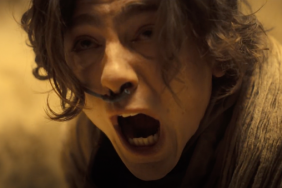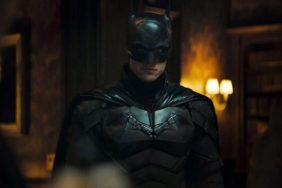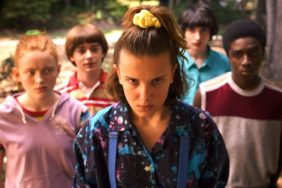This is an interview I’ve been waiting two years for, and I’d like to think Jaco Van Dormael has been waiting four. Mr. Nobody played the 2009 Venice Film Festival where it won the Biografilm award for fiction and Golden Osella for Outstanding Technical Achievement. Yet it did not get a U.S. release. The 2011 Los Angeles Film Festival played it in their “Films That Got Away” series, where it completely blew my mind.
Mr. Nobody posits a world in which every choice one could possibly make exists simultaneously. This follows Nemo Nobody (Jared Leto)’s life from childhood through old age in a sci-fi future with stem cell pigs. I figured nobody would ever see this again, so every time I interviewed an actor from the film – Juno Temple, Sarah Polley, Diane Kruger – I asked them about Mr. Nobody for myself.
Well, it turns out there is a reality in which Mr. Nobody opens in the U.S. It is now on VOD and coming to theaters this weekend. I finally got to speak with writer/director Jaco Van Dormael by phone, and he had read my Kruger interview where we spoke about Mr. Nobody. Our worlds were destined to meet after all.
CraveOnline: Have there been any cuts or alternate versions for the U.S. release?
Jaco Van Dormael: The original version which is something like 20 minutes more will be on VOD and on DVD too. It’s a little shorter for the theaters because of the length. Some people prefer the short version, some people prefer the long version. I prefer, of course, the director’s cut because I am the director.
How does a 2009 Venice Film Festival winner not get released in the States for four years?
I think everything that happens with this film, the film is uncommon and how the film travels is uncommon too. I think it’s arriving in the States with the speed of a message in a bottle that slowly floats until America. I think even a message in a bottle can be faster, but finally what’s great is that it arrives, because in some countries perhaps it was too early. In France they say it’s too early for that film. We’ll see if in America it’s just in time. We don’t know, but I think making a film is, for me, like dropping a message in a bottle. I never know how the message will be received. I think there are more questions than a message and it’s always a miracle when some people see it, especially here in their own language without subtitles.
That is a great way to look at it and so appropriate for the movie. I believe your premise in Mr. Nobody, that every choice we could possibly make exists simultaneously. Have you been doing some metaphysical reading about this subject?
No, it’s the point of view of the young, the point of view of the old man. The kid doesn’t know what’s the truth because he doesn’t know what is the right choice. The old man says there is no bad choice. Every choice is the right choice. Every life is worth living and ever person is worth loving in this strange experience we have just to be alive. It’s the only thing we can do is be alive. Scriptwriting our own lives, wanting something we don’t have, trying to be somebody we are not or being anxious of being or not being, we are just alive.
That experience is already so strange, to wake up in the morning and to be you and not somebody else. To be here and not somewhere else in another time, it’s already something crazy and a miracle. I think the old man looks behind and the kid looks in front. That’s why the structure was very important to me in the script. Instead of focusing to one end, it goes to multiple ends. The questions are still there, even if there is no answer. A little bit like in life. I think the questions last longer than the answers and the questions are often more interesting than the answers.
At what point in writing the script did you figure out where it would all converge?
That was the starting point in fact. I made a short film in 1982 that was called E pericoloso sporgesi that was a 12 minute film that was the kid on the platform. He has to choose to go with his father or stay with his mother. He looks at the two different lives, sort of has a premonition of the two different lives. At the moment he knows what will happen, the choice is impossible because in both stories, both lives are full of love, full of suffering, full of happiness, but it’s just different. So the starting point was really the end. For the kid it’s a flashforward. For the old man it’s a flashback. The two views crossed are in fact the subject.
It seems like a considerable budget for all the visual effects. How did you raise the money or get backing?
It took a little time. I had a good producer, Philippe Godeau who raised the money. It was too expensive, that’s for sure. I try to make less expensive films. Most of the time more experimental films are cheap or films that are trying to innovate something in the language are cheap and I wanted to make something that innovates in the language with a normal budget. Normal, it’s a high budget of course. The shooting was very long. The shooting was six months but after all, six months without a hurry, six months with the possibility of working on every shot so the shot is as close as possible to what it should be.
Why did you decide to make the film in English, rather than a French movie?
At the beginning, I wrote it in French. The distance from the feeling between Belgium and the south of France, which was the distance between the life with the father and the life with the mother, was more difficult. Also, for me, it’s just because I’m a French speaker, for me films in English are less concrete in a way. Perhaps for English speaking people, a film in French is less concrete but for me, when you see a film of Hitchcock, it’s not really happening in America. It’s not really happening in North Africa. Everything is a little bit cinematic and I wanted to work on that cinematic idea.
Also, my father speaks Flemish, my mother speaks French, I grew up in Germany so I’m not really attached to a language. My fluent language is French of course but sometimes, because English is the language of the cinema, sometimes the dialogue arrives in my head in English instead of French.
There was a movie earlier this year called Upstream Color that also involved pig DNA. Were you aware of that?
I didn’t know that. I will have to look that up.
You were onto something with the stem cell pigs four years ago.
That’s great. Films always make other films and ideas make other ideas. It’s good to share. Ideas are always good to share.









